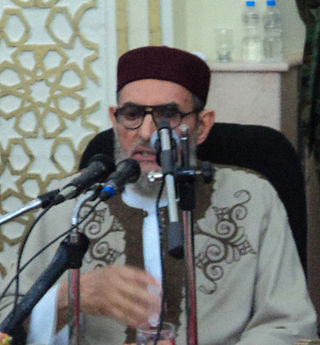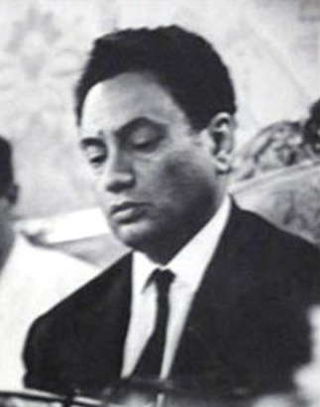
Wanis al-Qaddafi was a Libyan politician. He held many positions in the era of the Kingdom of Libya and was the tenth Prime Minister of Libya from 4 September 1968 to 31 August 1969, when his government was overthrown by Muammar Gaddafi.
The media of Libya consists of a broad range of newspapers, TV channels, radio stations, and websites mostly set up during or after the Libyan Civil War, which removed previously tight restrictions on freedom of the press and freedom of speech. By the summer of 2012, there were over 200 registered newspapers, over 20 TV channels, and 200 radio stations.

The University of Tripoli (UOT) (Arabic: جامعة طرابلس), is the largest university in Libya and is located in the capital city of Tripoli. It was founded in 1957 as a branch of the University of Libya before it was divided in 1973 to become what is now known as the University of Tripoli.

The Kingdom of Libya, known as the United Kingdom of Libya from 1951 to 1963, was a constitutional monarchy in North Africa that came into existence upon independence on 24 December 1951 and lasted until a bloodless coup d'état on 1 September 1969. The coup, led by Muammar Gaddafi, overthrew King Idris and established the Libyan Arab Republic.
Huda Ben Amer is a former Libyan politician. A follower of the Libyan ruler, Colonel Muammar Gaddafi, she was the Secretary of the General People's Congress of Inspection People's Control and mayor of Benghazi until the Libyan Civil War.

Voice of Free Libya is the name used by three radio stations aligned to the anti-Gaddafi forces that began broadcasting in February 2011, operating from the cities of Benghazi, Bayda and Misrata. They played an important role in the Libyan Civil War and have continued to broadcast after the fall of Gaddafi.
Free speech in the media during the Libyan civil war describes the ability of domestic and international media to report news inside Libya free from interference and censorship during the civil war.

Salwa Fawzi El-Deghali is a Libyan academic and a member of the National Transitional Council representing women and in charge of legal affairs. El-Deghali possess a Doctor of Philosophy in constitutional law. She taught at the Academy of Graduate Studies in Benghazi.
Hala Misrati is a Libyan writer, television anchor and journalist. She came to wide prominence around the Arab world during the First Libyan Civil War, during which she made pro-Gaddafi government broadcasts on Libyan state television.
Abdel Wahab Mohamed Qaid, alias Abu Idris al-Libi is a Libyan politician and former militia leader. Since 2012, he has been a member of the Libyan Parliament and the head of the National Border Guard for southern Libya.

Al-Sadiq Abd al-Rahman Ali al-Ghariani has been the Grand Mufti of Libya since 2012. He is a Muslim imam of the Maliki school of thought. Academically he is a seated professor in the College of Sharia in the University of Tripoli since 1969 and distinguished contributor the Maliki school of thought with his numerous publications.

Feras Kilani is a Palestinian-British journalist and film maker, and BBC Arabic's special correspondent.He is best known for his coverage in war-zones in the Middle East, specifically reporting from Libya, Iraq and Syria
Seham Sergiwa is a Libyan psychologist elected to the Libyan parliament in 2014. She was abducted by a Libyan National Army militia loyal to Khalifa Haftar on 17 July 2019. The United Nations Support Mission in Libya expressed its deep concern and stated that "silencing the voices of women in decision-making positions [would] not be tolerated." As of 17 October 2019, Sergiwa's location was unknown and the "authorities in eastern Libya" had not published the results of any investigation.

Huda El-Sarari or Hoda El-Sarari; Hoda Al Sarari is a Libyan journalist, poet and television executive. She runs the 218TV channel, the "most popular", in Libya. She is said to be the first woman from Libya to gain a place in both the Arab and global rankings as one of the influential Arab personalities.

Salah Masoud Busir was a Libyan politician, journalist, and historian. Born into a merchant family, he grew to have a successful career in journalism, politics, and science. He was an advocate for Arab values and for the independence of Libya from Italy. Busir was a strong opponent of first the Italian colonial occupation of Libya, and later the United Kingdom as well as the Libyan monarchy. As a result of this, he was forced to emigrate from Libya on two separate occasions. The 1969 Libyan coup d'état and subsequent coming to power of Muammar Gaddafi in 1969 allowed him to return from his 14-year exile. He became the first Foreign Minister of the Libyan Arab Republic and sought to eliminate foreign military bases in Libya. In 1972, he tried to promote his ideas at the pan-Arab level, but in February 1973, the plane on which he was flying was shot down by an Israeli fighter over the Sinai Peninsula.

The Battle of Bayda was the first conflict that broke out during the First Libyan Civil War between the brigades of Colonel Muammar Gaddafi and the Libyan rebels in the 4th-largest city in the country, the city of Bayda and its suburbs. The battle took place as a result of the demonstrations calling for the fall of the regime in Bayda, and after that the demonstrators clashed with the internal security in the city and the Talaa Khamis Brigade and the mercenaries and the Hussein Al-Jouifi Brigade stationed in Shahhat and Al Abraq International Airport in Bayda. The fighting continued one day in Bayda and the city was liberated, and then the Libyan revolutionaries headed to the outskirts of the city in Shahhat and Al-Abraq Airport. The revolutionaries were able to control the city and its suburbs, and thus Bayda was the first city to break out of Gaddafi's control and remained under their control throughout the revolution.

Khadījah Muhammad Abdullah Al-Jahamī, also knowns as Bint al-Watan, was a Libyan writer and radio broadcaster, who is considered one of the pioneers of advocating for women's rights since the Italian colonial period in Libya.

Ann El Safi, full name Ann Adil Ya’Seen Hajj El Safi is a Sudanese journalist, writer, novelist, and engineer. Up to 2019, she has published poems and novels as well as articles on mass media in modern societies in her native Arabic.

Ahmad Abd al-Ghafur Attar was a Saudi Arabian writer, journalist and poet, best known for his works about 20th-century Islamic challenges. Born in Mecca, capital city of Hejazi Hashemite Kingdom. He received a basic education and graduated from the Saudi Scientific Institute in 1937, took a scholarship for higher studies in Cairo University, then returned to his country and worked in some government offices before devoting himself to literature and research. Attar wrote many works about Arabic linguistic and Islamic studies, and gained fame as a Muslim apologist, anti-communist and anti-Zionist, he who believed in flexibility of Islamic jurisprudence for modern era. Praised by Abbas Mahmoud al-Aqqad, he was also noted for his defense of Modern Standard Arabic against colloquial or spoken Arabic. In the 1960s, he established the famous Okaz newspaper and then the Kalimat al-Haqq magazine, which lasted only about eight months. He died at the age of 74 in Jeddah.
Muhammad Umar al-Mukhtar was the only son of the well-known Libyan mujahid Umar al-Mukhtar.












